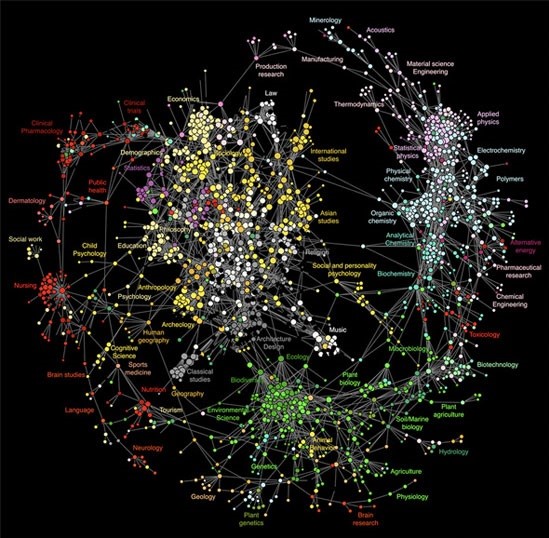All branches of science are different means of studying the universe along different points on the same spectrum. Physics, chemistry, biology, evolutionary psychology, social psychology, anthropology, ecology and all other fields of science are divided in ways that make it easier for us to study them and more comprehensible for us to understand. Atomic physics is not separate from chemistry just as chemistry is not separate from biology; both fields study atoms but on two different scales. Science is our best tool for understanding how the universe works. Therefore the grand synthesis of understanding the universe requires a unification of scientific knowledge.
Unifying the Scientific Disciplines
Connecting physics to chemistry to biology
Making all the connections for adjacent fields of science is easier for some fields and more difficult for others. Atomic physics studies electrons as they move around the nucleus of an atom and what happens as a result. Chemistry studies how atoms interact with other atoms by forming and breaking bonds and what happens as a result. The jump from chemistry to biology is more difficult to make due to the immense magnitude of the billions of chemical reactions happening within a biological organism, but can be made easier to understand by organizing the information into subfields such as biochemistry. But no matter how you look at it, all of biology is still grounded in chemistry. Biology studies how certain chemicals organize and interact with each other to make life happen. Evolutionary biology studies how chemicals got into the specific arrangements that make life possible and how those arrangements change over time.
Making the jump from biology to psychology and ecology
The same connections can be done for all other fields of science. The jump from biology to evolutionary psychology is probably the most difficult because that depends on understanding how the brain creates thoughts, feelings, urges, desires and so on. That does not mean the jump is impossible to make, it just means it’s difficult for some people to understand how the jump can be made. Evolutionary psychology studies how the mind works and the mind is the product of the brain, which is a biological organ. The brain was created by genes, which are units of chemistry all composed entirely of atoms. There has never been a single function or property of the brain observed or discovered that did not obey well established laws of chemistry. It is just that there are so many combinations of complicated chemical reactions happening inside the brain that trying to understand the functioning of the brain in terms of chemistry makes the task impossible for us. A person would die of old age before he could map out a chemical formula for the brain, and even if it was possible to do so it would be completely worthless since nobody else would be able to use it or understand what it meant or how it worked.
All human behavior is a function of the design of human brains. As a social species, we are constantly interacting with each other in the ongoing struggle for survival and reproduction. Social psychology studies how brains and minds of humans interact with other brains and minds while in groups. We share this planet with not only humans but with all other species. Ecology studies how groups of biological organisms interact with themselves and their environment. Ultimately, every field of science is just a specialized field of atomic physics. The trick to a unification of scientific knowledge is using first principles to connect and make fluid transitions between adjacent scientific fields, and then build up a body of information from there. The goal of this web site is to connect the disparate fields of science and use that knowledge and information in improving our own lives and society.
Further reading: Consilience by E.O. Wilson
